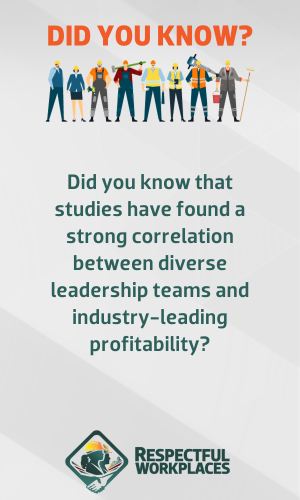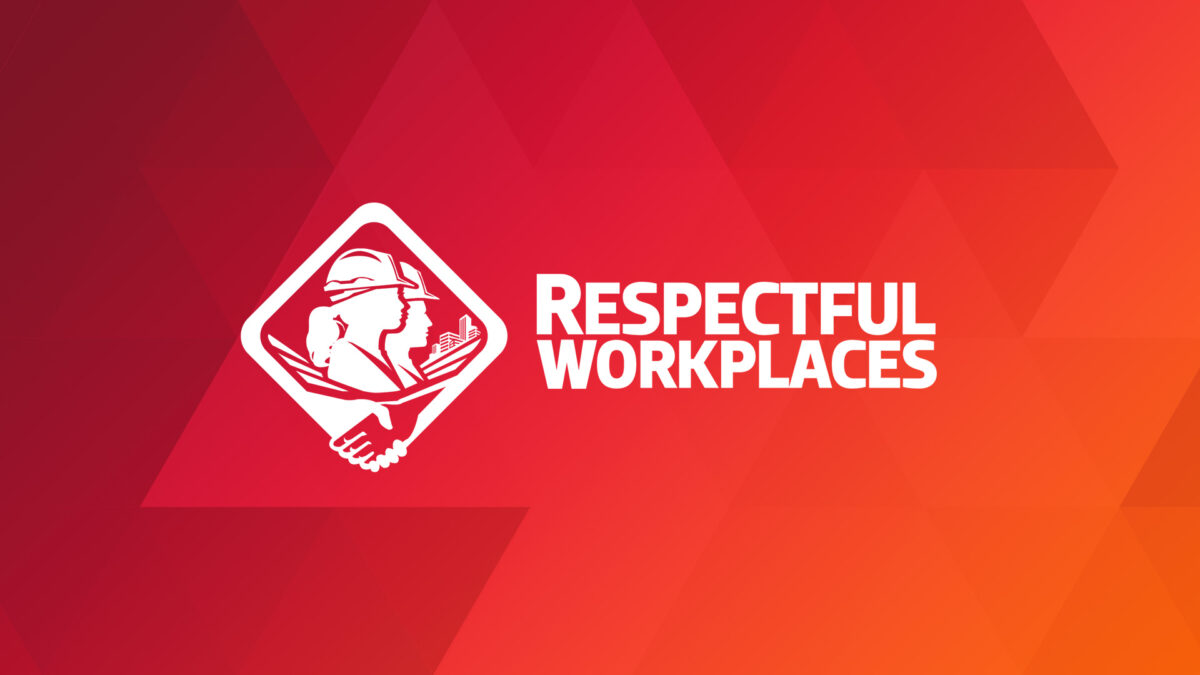Does your organization develop inclusive leaders?

Canada’s workforce demographics are changing rapidly, and in the skilled trades in particular. In the next decade, as much as 40% of Canada’s labour force will be over the age of 55. That figure would mark the highest proportion on record.
The latest edition of our Construction and Maintenance Looking Forward labour market information report finds that as many as 245,100 workers, or about 20% of the 2022 labour force, will retire from the construction sector between 2023 and 2032. Growing demand for construction services over the same period is estimated to bring the sector’s overall hiring needs to more than 299,000.
Inclusivity may be the recruiting solution construction needs
If it is to meet this challenge, Canada’s construction sector will need to create inclusive workplaces. Younger workers in particular want to work in organizations that they perceive to be diverse and inclusive. They also believe that a senior leadership team that is demographically diverse is more likely to be more financially successful.
These perceptions are supported by research. A 2018 McKinsey study, titled Delivering through Diversity, found that a leadership team that includes women, LGBTQ+ and ethically/culturally diverse individuals is strongly correlated with industry-leading profitability.
Although correlation is not causation, it is believed that correlation exists because organizations with diverse leadership teams are better able to attract top talent, maintain high levels of worker satisfaction and decision making.
This means that construction organizations will need to be inclusive of younger workers from traditionally underrepresented groups, such as women, members of Black, Indigenous and People of Colour communities, LGBTQ2S+ workers and Newcomers. Its leaders must work to shift perceptions of construction as a sector that lacks diversity and is resistant to change.
Speak up!
According to Deloitte’s 2023 Gen Z and Millennial Survey, younger workers report being satisfied with their organization’s efforts to create a diverse and inclusive culture when they feel they can “speak up” with relevant ideas, questions, or concerns. Speaking up describes the back-and-forth exchanges people have at work, whether offering a concern in a meeting or giving feedback to a coworker.
However, research shows that younger workers in senior leadership are more likely to feel empowered to speak up than those in junior positions. Gen Zs (65%) and millennials (64%) in senior leadership positions are more likely to say that their organization seeks input from workers at all levels and incorporates their feedback compared to 43% of Gen Zs and 37% of millennials in junior positions.
To create an inclusive organization where all workers feel empowered to speak up, organizations will need to develop transformational leaders who empower others and foster feelings of belonging through all levels of the organization.
Inclusive leaders are key
Many researchers have identified “inclusive leaders” as the key to attracting and retaining top talent from all talent pools. These leaders understand the high importance of creating a speak up culture where workers feel a sense of belonging: they know that their managers want to hear from them and their feedback is incorporated into decision making.
Inclusive leaders are:
1. Approachable and accessible. In a speak-up culture, workers know that their manager wants to hear from them. These managers acknowledge the fact that they can make mistakes. They invite input (see below) and more importantly, they express appreciation for the input, no matter the quality. When workers speak up, a manager’s initial response must be appreciative, “Thank you for bringing that issue up.” Only then, should the manager give feedback, explain the subtleties of the given situation or probe further.
A manager’s conscious efforts to be approachable and accessible may be especially welcome to members of traditionally underrepresented groups who experience exclusion and barriers as a result of unconscious beliefs and behaviours. Recall that conscious efforts are required to recognize and overcome unconscious habits (see Blog #49 for an in-depth discussion). Managers who consciously make efforts to be approachable and accessible are more likely to overcome any unconscious bias influencing their behaviours.
2. Humble and curious. No one wants to take the risk of suggesting ideas when the boss appears to think they know everything. A learning mindset, which blends humility and curiosity mitigates this risk. It recognizes that there is always more to learn.
This may be particularly important for organizations that want to understand the experience of members of traditionally underrepresented groups. Studies show that those in leadership positions tend to underestimate by 10 to 15 percent the bias in recruiting, retention, and advancement reported by members of underrepresented groups. Managers who are willing to admit that they don’t know everything will be more likely to appreciate different perspectives.
3. Open to input from those at all levels in the organization. This is purposeful probing to learn more about an issue, situation, or person. The foundational skill lies in cultivating genuine interest in others’ responses. This can be difficult because all adults, especially high achieving ones, are subject to a cognitive bias called “naïve realism”. This causes us to believe that we are seeing life objectively, when in fact, we have a subjective view of reality. As a result, we often fail to even ask the questions.
Organizations that want to address the barriers that members of traditionally underrepresented groups experience need to hear the reality from those experiencing the barriers. Especially because managers tend to be members of an in group, they will not have opportunities to learn about those barriers unless members of outsider groups are actively encouraged to inform. One of the greatest dangers for leaders is that people aren’t telling them the truth. Leaders must constantly seek input, and ensure that people feel safe to speak up.
In order to attract and retain younger workers, organizations will need to develop inclusive leaders who empower workers, including those from traditionally underrepresented groups, to speak up with relevant ideas, questions, or concerns.
Organizations in which leaders are approachable and accessible, humble, and curious, and which invite input from those at all levels in the organization will be rewarded with access to top talent, higher than average levels of engagement, decision making and industry-leading profitability.
Resources:
- Dnika J. Travis, Shaffer, E., & Thorpe-Moscon, J. (2020). Getting Real about Inclusive Leadership. Catalyst. See https://www.catalyst.org/wp-content/uploads/2020/03/Getting-Real-About-…;
- Edmondson, Amy C. The Fearless Organization. New Jersey, U.S.A., John Wiley & Sons, 2019.
Read from the beginning. Click here to start at Part 1.
What can an effective Respectful and Inclusive Workplace Program deliver?
- Become an employer of choice – attract, retain, and advance top talent from all sources of labour
- Unlock collaboration and innovation – create high-performing teams through diversity of thought and experience
- Build your brand – your organization will gain a competitive edge as a leader and innovator
Get started today!
The BuildForce Canada Online Respectful and Inclusive Workplace Toolkit includes:
- the Respectful Workplace Online Self-Assessment Tool to assist organization leadership in assessing their current situation and identifying where they may need to make changes
- the Respectful Workplace Policy Framework and Implementation Guide to assist organizations in creating and implementing a policy that supports a respectful and inclusive workplace
- the Respectful Workplace Online Training Course to train workers on how to create and support a respectful and inclusive workplace
- the online course Introduction to Understanding Systemic Racism: A Guide for Leaders and Managers
All the resources you need to create and support a respectful and inclusive workplace!

Respectful and Inclusive Workplaces
